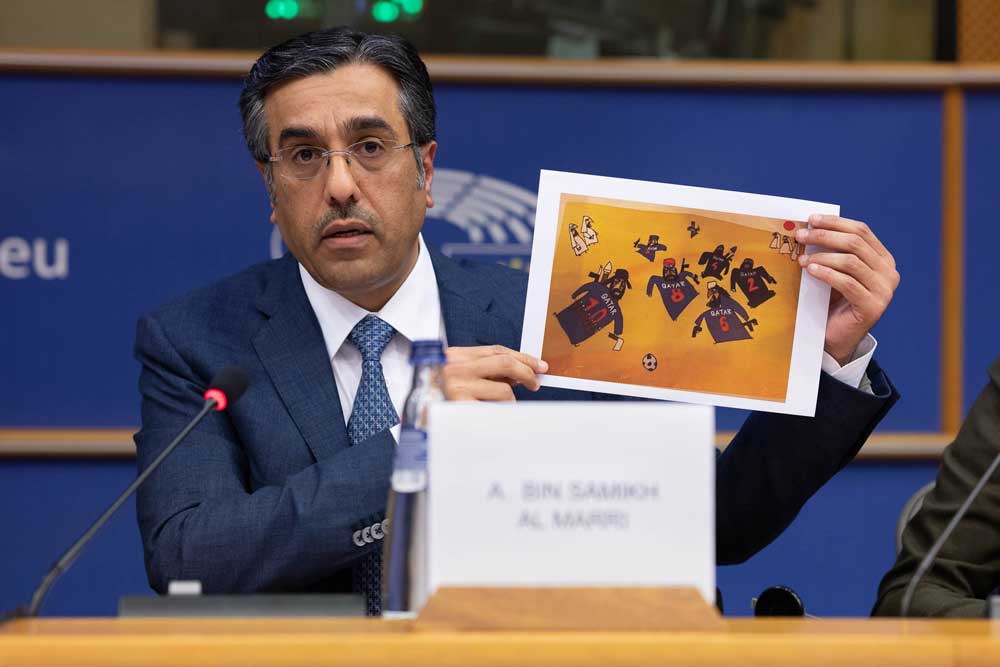Officials in Qatar have previously described some of the criticism as a targeted campaign rooted in racism against the first World Cup in the Arab world.
Qatar will not tolerate “racism and hate speech” targeting Qatari people and the national team ahead of the FIFA world cup, Qatar’s labour minister said during a heated debate on human rights with members of the European Parliament on Monday.
“We do not want to close the door to constructive criticism,”Ali bin Smaikh Al Marri said during a meeting of the Parliament’s subcommittee on human rights. “However, there should not be any politicising.”
The meeting comes amid growing criticism, primarily from Western media, as well as reports from rights groups, about Qatar’s record of human rights violations, particularly with regard to migrant workers and the LGBTQ+ community.
The Qatari minister claimed that inaccurate figures on migrant worker deaths were being reported and that “some media, unfortunately, said that Qatari nationals are a bunch of terrorists.”
Such reports, he added are part of a wider “smear campaign” against Qatar.
“The negative campaign against Qatar has not only lost the compass of truth but has also lost logic and rationality,” he said.
“We call on international human rights organisations to take firm stances towards the Qatari people,” adding that this “smear campaign” has deviated from real issues about migrant rights to hate speech that offends Qatari people.
This was primarily in response to last week’s outrage, when French publication Le Canard Enchaîné published a caricature depicting Arabs dressed in Qatar football jerseys as terrorists.
The image employs the exhausted use of ‘savages’ – ‘long bearded’ angry men with dark hair, angry expressions in possession of guns and knives.
When it comes to migrant worker rights, the Gulf state says it has responded by introducing reforms to its legislation, all of which have received global praise by rights groups including the UN’s International Labour Organization, which has set up an office to oversee such changes in Qatar.
Despite this, some headlines that have been repeatedly slammed by officials as “sensationalist” and “misleading” have continued to emerge across western press.
This was heightened when The Guardian published a controversial piece last year headlined, “Revealed: 6,500 migrant workers have died in Qatar as it gears up for World Cup”.
The article had linked the “shocking” death rate to the start of Qatar’s World Cup journey.
Al Marri said it is illogical to say that 6,500 workers died during the period of building and equipping the World Cup facilities, which is an average of two deaths a day.
Max Tuñón, head of the ILO in Doha, also addressed the MEPs and highlighted the progress Qatar has made in terms of new legislation on workers’ issues such as dealing with heat stress, cooperating with trade unions, and dealing with visas.
However, Minky Worden, director of global initiatives at Human Rights Watch, said “reforms remain insufficient,” pointing to a lack of protection for migrant workers, as well as issues with press freedom, and women’s rights and LGBTQ+ rights.
She called on FIFA and Qatar to commit to a remedy fund that provides financial compensation to workers who “suffered to make this tournament happen” and their families.
This demand was rejected by the Qatari minister, who said that there are already such mechanisms in place to compensate victims.
Commenting on the campaign earlier this month, the Gulf state’s Foreign Minister Sheikh Mohammed bin Abdulrahman Al Thani told France’s Le Monde that “the fund already exists and has proven its value”, noting Qatar has disbursed $350 million last year alone.
“This money went to employees who were deprived of their wages and whose companies are now facing court cases, to employees who were injured at work or to cases of work-related deaths. This mechanism works very well. So why should we duplicate it?” he said.
In a follow up question by the French outlet which cited a meeting with a woman in Nepal whose husband died without being compensated, Sheikh Mohammed said Qatar would be prepared to assist.
“You can lead us to these cases, and we will guide them to the fund,” he said.
Over recent years, Qatar has doubled up its efforts to protect workers by partnering with key global rights organisations, including the United Nations ILO.
The ILO opened its first office in Qatar in 2018 to assist with and overlook efforts by authorities to improve the local work environment. This included the introduction of mass labour reforms that dismantled the controversial Kafala system.
In 2021, the region’s first non-discriminatory minimum-wage law also came into force, which established a monthly minimum wage of QAR 1,000. The law also includes the basic living allowances for select workers.
Employers who fail to comply with the law face a one-year jail sentence and a QAR 10,000 fine.
Despite this, the demand for compensation was supported by several MEPs, with lawmakers from across the spectrum lambasting Qatar over its record on human rights, Politico reported.
After the meeting, Worden of Human Rights Watch said this was “the toughest session” held by MEPs on human rights in connection to a big sporting event, with lawmakers taking a harder line than in sessions before the World Cup in Russia 2018 and the Olympics in Beijing this year.







